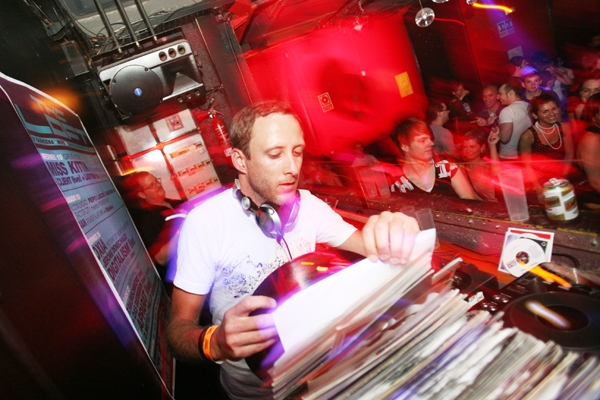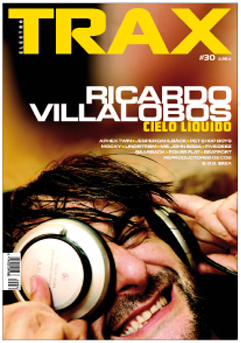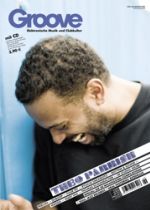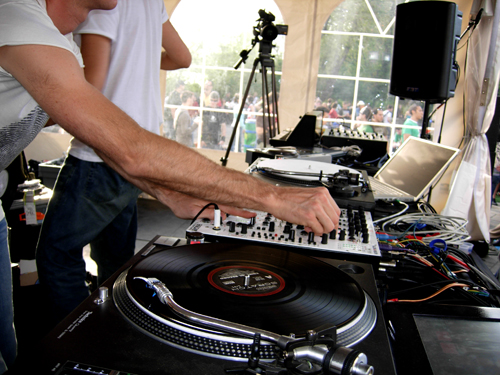
In which Magda and the author show that there's more to miniMAL than cracking beats and an unbroken arc of prime, psychedelic noodle — it also requires a fierce pair of shades. (Note: I'm well aware that they look better on Magda. She also has better (and more) hair than I do, but you just can't get yourself worked up over life's little unfairnesses.) You can't see in the photo, but we're both wearing what are apparently called "minimal jeans," at least according to a disparaging comment overheard by Magda. And according to Ubercoolische, Resident Advisor and Simply Islam (where they even mention Fabric, though I can't figure out if it was a Villalobos gig or not), I seem to be wearing a "minimal scarf," though I'm not sure how it got there.
As you can see, the life of a techno journalist is not just endless junkets, bottomless drink tickets, and filing stories via wi-fi from the hot tub: it also entails a long, hard slog through the festival trenches. Which might explain why this post is giddier than the norm, since MUTEK 2006 was perhaps one of the best festival experiences I've ever had. I'll save the details for a later date, either here or in Pitchfork, but to suffice to say that despite disappointing weather, a Piknik Electronik forced to move indoors for the same reason, resulting in harshed buzz for performers and sun-worshipping listeners alike, and a few artists who either didn't quite step up their game or intentionally took the piss, MUTEK just swelled and swelled, getting better and better across its five days of programming. By the end we all were beaming: Magda, Marc Houle, Troy Pierce, and Richie Hawtin and Ricardo Villalobos ruled the park for Sunday's Piknik, when the sun finally did deign to come out — Rich and Ricardo pulling it off in a way I doubted they could, frankly, staying deep and subdued and way fucking housey, especially for Rich, whose last outdoor set I heard (at Pollerweisen, Cologne) was by and large indistinguishable from a basement techno set, at least for the first several hours. That evening at the Darling Foundry, Mike Shannon, Jan Jelinek, Pole and Deadbeat all gave the best sets I've heard from any of them, ever. Jelinek in particular was a cosmic destroyer, turning drones and Krauty motorism into some kind of four-dimensional supernova that I'll probably never find words to describe, so please just take my word for it and go see him as soon as humanly possible. But it was Deadbeat that laid waste to everyone.
Now, I've always liked Deadbeat's music, and he's also a friend of mine. But I've also never had a real moment of jaw-dropping revelation from him, either live or on record. But Sunday night, he became someone else: the dub/reggae foundation was still there, but every last shred of politeness fell away as he built up his set, reinforcing the structure with steely techno girders, kicked us behind the knees with devastating dancehall beats, and even snuck in reggaeton rhythms to truly send everything reeling. His sound design was expansive and spectacular (almost literally, in the sense that his timbral mashups sparked starry-eyed, synaesthetic images behind blissfully closed lids) and his sense of pacing and flow absolutely immaculate. He needs to record an album to reflect his live intensity — if he can capture it, not just the breadth but also the deep reach (as in, reaching inside your chest and recalibrating your very heartbeat). But the live set is truly something to behold, and maybe even more important than a recording, given how record-focused electronic music tends to be. Laptop sets just don't come this intense (angry but ecstatic, and vice versa) very often. See him. Book him. Drag along your rocker friends, because dammit, this music has been mouldering in its niches for too long.
(Oddly, when trying to think of other artists who carry the audience like Deadbeat did, the first two acts that come to mind are Modeselektor and Diplo — the former who played another killer [and highly eclectic] set at MUTEK, bridging dancehall, hip-hop, and full-on rave; the latter who DJ'd a private afterparty, unaffiliated with the festival, that turned out to be one of the week's best events, if only because it was completely unexpected. [Frankly, I've never been a huge Diplo fan, in part because of my own hipster-not-hipster baggage and a longstanding love/hate grudge with New York, but I stand corrected. He even got me to dig "Laffy Taffy," for fuck's sake. That shit's minimal as hell — can't we all just get along, already?])
A snappy kicker would say something like, "Let's be cool, move to Berlin, and buy minimal shades." But you know what? I'm over the snarky self-deprecation. Wherever we are, be it Kreuzberg or Providence or Portland, let's find the music we love and rave our brains out, because nothing lasts forever. This is the only golden age we've got, and I'm telling you: after five days (and a couple days of afters) at MUTEK, it doesn't get much more golden than this.




